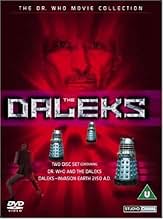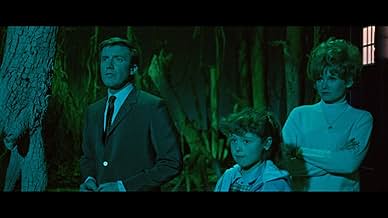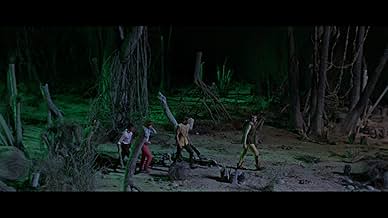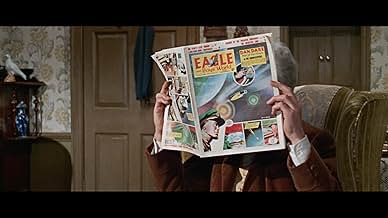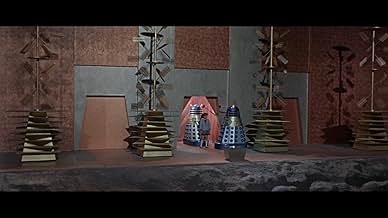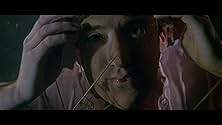VALUTAZIONE IMDb
5,6/10
5637
LA TUA VALUTAZIONE
Aggiungi una trama nella tua linguaAn eccentric inventor and his companions travel in his TARDIS to the Planet Skaro and battle the evil menace of the Daleks.An eccentric inventor and his companions travel in his TARDIS to the Planet Skaro and battle the evil menace of the Daleks.An eccentric inventor and his companions travel in his TARDIS to the Planet Skaro and battle the evil menace of the Daleks.
- Regia
- Sceneggiatura
- Star
Nicholas Head
- Thal
- (as Nicolas Head)
Mike Lennox
- Thal
- (as Michael Lennox)
Recensioni in evidenza
The first time I saw Dr Who and the Daleks, I used to cower behind the sofa every time the Daleks appeared, and the music I remembered was incredibly haunting. Seeing it again, it isn't quite as good as I remembered, but it is an entertaining and passable enough piece of nostalgia. The script lacks bite at times, the plot isn't as inventive as any of the ones used in the landmark TV series, Roy Castle and the comedy relief felt out of place and on occasions because of the overuse of pink plastic sheeting the art direction was a little on the cheap side. However, the music is very haunting, the Daleks are still as intimidating as I remembered, the pacing is fast and fun, the length is amiable and Peter Cushing is terrific as the Doctor, more serious than any of the other doctors but it suits him. The female characters are admittedly on the vapid side, but the alluring personalities of Roberta Tovey and Jennie Linden made up for it. Overall, fun and nostalgic, even with its many faults. 6/10 Bethany Cox
When visiting his girlfriend Barbara, Ian is given a tour of the TARDIS by Dr Who. However he accidentally activates it and sends them to an unknown planet. Keen to explore they find themselves prisoners in a city controlled by the Daleks. The Daleks seek to rule the whole planet and get rid of the peace loving natives. When Dr Who et al accidentally help the Daleks to achieve this, they have no choice but to work with the natives to stop the Daleks.
Made to cash in on the huge popularity mid-sixties of both Dr Who and the Daleks, this film version has much higher values than the TV show, but doesn't mean it's better. The story is weak like an introduction to the Doctor. It's very basic and provides little opportunity for thrills right up until the final battle. It's not that bad, but for a film you'd expect more.
The Daleks themselves are good but the film uses them badly we see them as things trapped in a city with little power outside of their own walls. To make matters worse them seem very vulnerable and easy to beat all you have to do is push them very hard! They also don't `do' dialogue very well they are used several times for long scenes where they talk to each other and explain the plot to the audience, these scenes are poor as their delivery mixed with the dialogue is terrible!
Cushing makes a good doctor and is better than many of the TV incarnations. Record breaking Roy Castle is quite good as Ian, but his comedy clowning doesn't really fit in with the tone of the film. The female lead is vapid but Susan (played by Tovey) is actually pretty good.
Overall this is TV standard fans will enjoy it but anyone looking for thrills or good plotting will be disappointed. Check out Dalek Invasion Earth that is a much better use of these tin-can bad guys.
Made to cash in on the huge popularity mid-sixties of both Dr Who and the Daleks, this film version has much higher values than the TV show, but doesn't mean it's better. The story is weak like an introduction to the Doctor. It's very basic and provides little opportunity for thrills right up until the final battle. It's not that bad, but for a film you'd expect more.
The Daleks themselves are good but the film uses them badly we see them as things trapped in a city with little power outside of their own walls. To make matters worse them seem very vulnerable and easy to beat all you have to do is push them very hard! They also don't `do' dialogue very well they are used several times for long scenes where they talk to each other and explain the plot to the audience, these scenes are poor as their delivery mixed with the dialogue is terrible!
Cushing makes a good doctor and is better than many of the TV incarnations. Record breaking Roy Castle is quite good as Ian, but his comedy clowning doesn't really fit in with the tone of the film. The female lead is vapid but Susan (played by Tovey) is actually pretty good.
Overall this is TV standard fans will enjoy it but anyone looking for thrills or good plotting will be disappointed. Check out Dalek Invasion Earth that is a much better use of these tin-can bad guys.
First of all, I've seen several episodes of the Dr. Who series, but I don't follow it. It has its fan base and that's fine. If you are looking for a good Dalek adventure without getting into the whole Dalek "genesis," then this movie works well. You don't have to know all about Who-ville as a prerequisite.
There are some visual elements that needed more budget or something - miniature exteriors of the city, the burnt forest set, and the make-up on the humanoids don't quite make the grade. But the Daleks themselves inside their metal city are something to see (be sure to look for the lava lights). The Dalek robot mechanisms are very convincing, and they are very menacing as they roll around with their modulated voices trying to exterminate anything with two legs. The camera work is good - it looks like the director tried to add some interesting angles and follow shots when others maybe wouldn't bother. The cast plays well in their roles, and the story is simple and straight-forward. This is no "2001 A Space Odessey," but then again, you don't have to think too hard about what the ending really means.
This movie will probably disappoint most loyal Dr. Who followers, but it will entertain sci-fi fans who enjoy some light fare and aren't too attached to the series.
There are some visual elements that needed more budget or something - miniature exteriors of the city, the burnt forest set, and the make-up on the humanoids don't quite make the grade. But the Daleks themselves inside their metal city are something to see (be sure to look for the lava lights). The Dalek robot mechanisms are very convincing, and they are very menacing as they roll around with their modulated voices trying to exterminate anything with two legs. The camera work is good - it looks like the director tried to add some interesting angles and follow shots when others maybe wouldn't bother. The cast plays well in their roles, and the story is simple and straight-forward. This is no "2001 A Space Odessey," but then again, you don't have to think too hard about what the ending really means.
This movie will probably disappoint most loyal Dr. Who followers, but it will entertain sci-fi fans who enjoy some light fare and aren't too attached to the series.
A fun adventure film that, while it may be too dated for today's youngsters, still has a certain sparkle that is perfect fare for a rainy Saturday.
While fans of the BBC series "Doctor Who" (1963), upon which the film is based, may be distracted by the film's use of creative licence (the characterizations are very different from those of their television counterparts,) if not taken too seriously, this is a quite enjoyable trek across an alien landscape and a classic battle of good vs. evil.
The character of Ian is played comically by Roy Castle though he is heroic where the situation demands. Jennie Linden's Barbara is a bit different from other females of the genre as she holds her own when things get tough, rarely dissolving into screams. Roberta Tovey is delightful as Susan, and kids will love her. Peter Cushing really shines, wisely not trying too hard to emulate his television counterpart William Hartnell, and makes the character his own.
All-in-all, an exciting romp.
While fans of the BBC series "Doctor Who" (1963), upon which the film is based, may be distracted by the film's use of creative licence (the characterizations are very different from those of their television counterparts,) if not taken too seriously, this is a quite enjoyable trek across an alien landscape and a classic battle of good vs. evil.
The character of Ian is played comically by Roy Castle though he is heroic where the situation demands. Jennie Linden's Barbara is a bit different from other females of the genre as she holds her own when things get tough, rarely dissolving into screams. Roberta Tovey is delightful as Susan, and kids will love her. Peter Cushing really shines, wisely not trying too hard to emulate his television counterpart William Hartnell, and makes the character his own.
All-in-all, an exciting romp.
If, like me, you enjoy checking out the reviews *before* seeing the film, here's the premise in a nutshell: A mishap with silver-haired scientist Doctor Who's latest invention hurls the cast through space and time, landing them in the midst of an eerie alien wasteland. The Doctor's companions on this unanticipated adventure are his granddaughters Susan and Barbara, and Barbara's boyfriend Ian. Needing parts to repair their damaged time machine, the company seeks help in a nearby city, only to be captured and imprisoned by the ruthless mechanical Daleks, a race of machine-bound mutants bent on world domination.
To followers of the original TV series, this plot will be as familiar as the Daleks' squawking cries of 'Exterminate,' and despite some changes to the cast (most notably the Doctor being portrayed as a human), it faithfully captures the spirit of the early programs. For viewers who've never experienced the original Who, or who don't have a taste for early pulp-style adventure sci-fi, this movie will probably be less appealing. It's a fan flick pure and simple, expressly designed to capitalize on the wave of Dalekmania that swept Britain in the mid-1960s following the show's BBC premiere.
Ironically, the film's weakest link is the Daleks themselves. The writers and producers were no doubt keen to capitalize on the popularity of the metal meanies, but it has to be said that the Daleks really don't have much of a screen presence. With their absolute lack of expression, clumsy movement, and painfully slow, mechanical, grating voices, they should never have been scripted to carry any scenes by themselves; however (alas) there are more than a few passages in the film that consist of nothing more than Dalek cross-talk acts, with one metal peppergrinder haltingly rasping its lines to another. Still, I'm one who's been spoiled by the routinely mind-blowing special effects of the 21st century; to Britons of the '60s, the stuff I find boring might have seemed menacing.
Daleks aside, the most memorable aspect of the film is the eye-popping color. The filmmakers pulled out all the stops to give the sets a wonderfully vibrant feel, liberally filling every scene with multi-hued Daleks, glowing control panels, or eerily-lit alien landscapes. This film was the first opportunity for fans to see Doctor Who in color (sorry, `colour'), and they certainly got it in spades. (The original TV series didn't drop the black-and-white format until 1970, five years later.)
The film's greatest strength is its casting, with the best performance by far coming from veteran actor Peter Cushing, best known to U.S. audiences as Grand Moff Tarkin in Star Wars. Cushing's delivery is predictably brilliant, and helps bring conviction and flair to a script that might otherwise come off as unbearably campy. As the Doctor he's also just plain likeable - much more so in fact than his TV counterpart (played by William Hartnell) who often came off as crusty and gruff. Roberta Tovey as the young Susan also gives a marvelous performance, something that's a true rarity among kid actors. Jennie Linden does an adequate job as Barbara, though her character has no clear role in the story and was probably just included to suggest continuity with the TV series, while Roy Castle provides some (generally successful) comic relief with his portrayal of the bumbling klutz Ian. Kudos also to Barrie Ingham (Thal leader Alydon) for actually giving a credible performance from beneath false eyelashes and a blonde wig.
The bottom line? The film's a little too far removed from modern tastes to be enjoyed by the average Joe, but to Who fans and sci-fi aficionados it'll be a delight.
To followers of the original TV series, this plot will be as familiar as the Daleks' squawking cries of 'Exterminate,' and despite some changes to the cast (most notably the Doctor being portrayed as a human), it faithfully captures the spirit of the early programs. For viewers who've never experienced the original Who, or who don't have a taste for early pulp-style adventure sci-fi, this movie will probably be less appealing. It's a fan flick pure and simple, expressly designed to capitalize on the wave of Dalekmania that swept Britain in the mid-1960s following the show's BBC premiere.
Ironically, the film's weakest link is the Daleks themselves. The writers and producers were no doubt keen to capitalize on the popularity of the metal meanies, but it has to be said that the Daleks really don't have much of a screen presence. With their absolute lack of expression, clumsy movement, and painfully slow, mechanical, grating voices, they should never have been scripted to carry any scenes by themselves; however (alas) there are more than a few passages in the film that consist of nothing more than Dalek cross-talk acts, with one metal peppergrinder haltingly rasping its lines to another. Still, I'm one who's been spoiled by the routinely mind-blowing special effects of the 21st century; to Britons of the '60s, the stuff I find boring might have seemed menacing.
Daleks aside, the most memorable aspect of the film is the eye-popping color. The filmmakers pulled out all the stops to give the sets a wonderfully vibrant feel, liberally filling every scene with multi-hued Daleks, glowing control panels, or eerily-lit alien landscapes. This film was the first opportunity for fans to see Doctor Who in color (sorry, `colour'), and they certainly got it in spades. (The original TV series didn't drop the black-and-white format until 1970, five years later.)
The film's greatest strength is its casting, with the best performance by far coming from veteran actor Peter Cushing, best known to U.S. audiences as Grand Moff Tarkin in Star Wars. Cushing's delivery is predictably brilliant, and helps bring conviction and flair to a script that might otherwise come off as unbearably campy. As the Doctor he's also just plain likeable - much more so in fact than his TV counterpart (played by William Hartnell) who often came off as crusty and gruff. Roberta Tovey as the young Susan also gives a marvelous performance, something that's a true rarity among kid actors. Jennie Linden does an adequate job as Barbara, though her character has no clear role in the story and was probably just included to suggest continuity with the TV series, while Roy Castle provides some (generally successful) comic relief with his portrayal of the bumbling klutz Ian. Kudos also to Barrie Ingham (Thal leader Alydon) for actually giving a credible performance from beneath false eyelashes and a blonde wig.
The bottom line? The film's a little too far removed from modern tastes to be enjoyed by the average Joe, but to Who fans and sci-fi aficionados it'll be a delight.
Lo sapevi?
- QuizAs an incentive Roberta Tovey (who was 11 at the time the film was produced) was paid a shilling (5p) by director Gordon Flemyng every time she did a scene in one take. She made so much money, Flemyng didn't offer her the same deal for the sequel. For the modern day comparison, a shilling from 1965 had the buying power of £1 now, or about $1.30.
- BlooperUnless the TARDIS crew has shrunk at the close of the film, the stock Roman Legion footage is out-of-scale with the on-set actors.
- Curiosità sui creditiRobert Jewell is wrongly credited as Robert Jewel.
- ConnessioniEdited into Dr. Who and the Daleks (2013)
I più visti
Accedi per valutare e creare un elenco di titoli salvati per ottenere consigli personalizzati
- How long is Dr. Who and the Daleks?Powered by Alexa
- Why isn't Amicus Productions credited?
Dettagli
- Data di uscita
- Paese di origine
- Lingua
- Celebre anche come
- Dr. Who y los Daleks
- Luoghi delle riprese
- A Stage, Shepperton Studios, Shepperton, Surrey, Inghilterra, Regno Unito(Dalek City interiors)
- Aziende produttrici
- Vedi altri crediti dell’azienda su IMDbPro
Botteghino
- Budget
- 180.000 £ (previsto)
- Lordo in tutto il mondo
- 114.062 USD
- Tempo di esecuzione1 ora 22 minuti
- Colore
- Proporzioni
- 2.35 : 1
Contribuisci a questa pagina
Suggerisci una modifica o aggiungi i contenuti mancanti

Divario superiore
What is the French language plot outline for Dr. Who and the Daleks (1965)?
Rispondi


